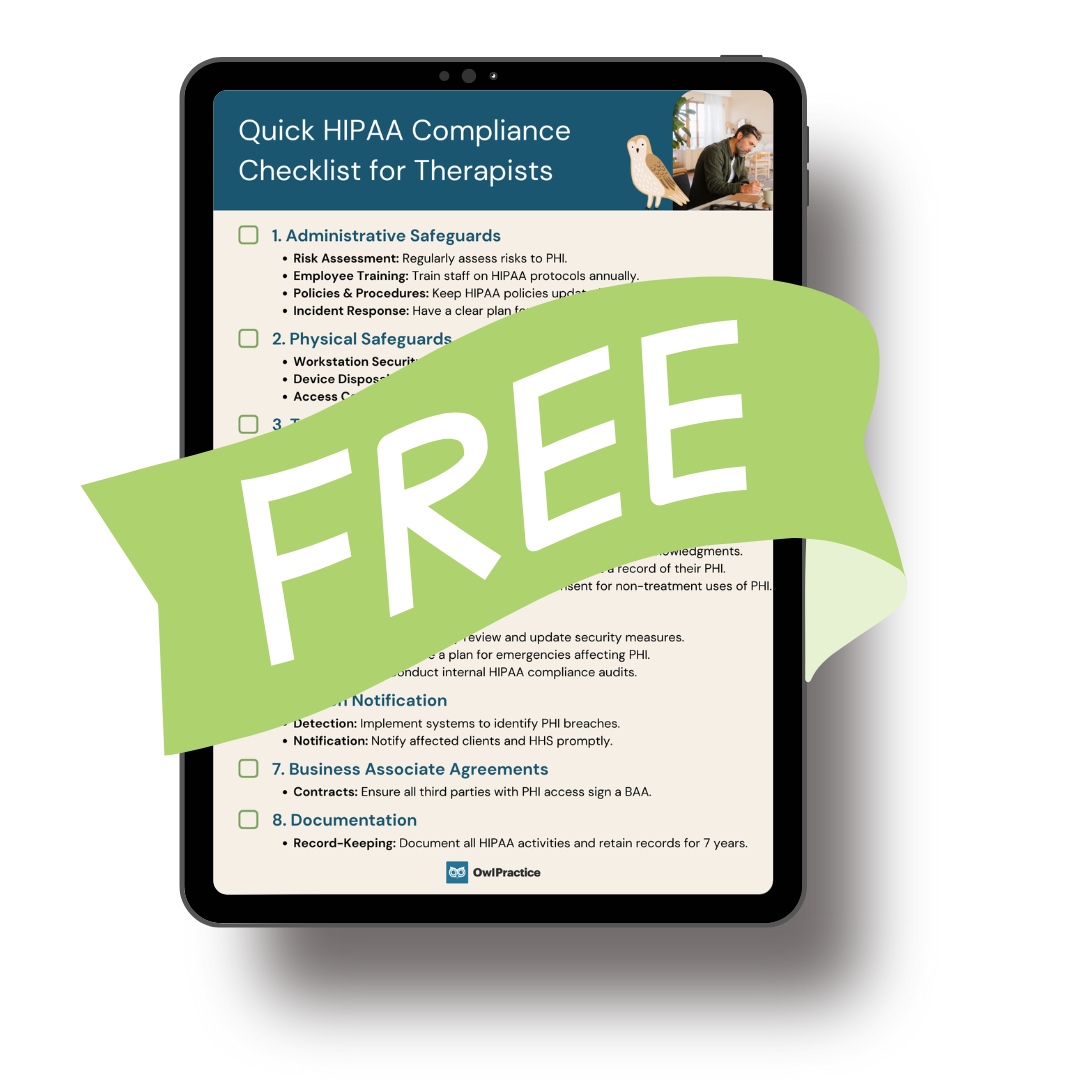Starting or managing a private practice is a significant responsibility, especially when it comes to protecting your clients’ sensitive information. Ensuring your practice is HIPAA compliant is essential, not just for safeguarding your clients but also for protecting your business from legal and financial risks. Whether you’re new to private practice or a seasoned therapist, navigating HIPAA compliance can feel overwhelming, but with the right guidance, it becomes manageable. This guide will walk you through the basics of HIPAA and provide practical steps to maintain compliance, with answers to some frequently asked questions.
1. What is HIPAA and why does it matter?
The Health Insurance Portability and Accountability Act (HIPAA) is a federal law that sets the standard for protecting sensitive patient information. For therapists, this means ensuring that your clients’ health information, also known as Protected Health Information (PHI), is kept confidential and secure.
Do therapists need to be HIPAA compliant?
Yes, therapists must be HIPAA compliant if they transmit any health information electronically in connection with a transaction for which the Department of Health and Human Services (HHS) has established standards. This typically includes billing, insurance claims, and other administrative functions. Even if you don’t submit electronic claims, adhering to HIPAA’s privacy and security standards is considered best practice for protecting your clients’ information.
HIPAA compliance is crucial in private practice because it helps maintain trust between you and your clients, ensuring that their private information is handled with care. Non-compliance can result in severe consequences, including hefty fines, legal action, and damage to your professional reputation. Understanding and implementing HIPAA requirements is not just a legal obligation but a vital part of running a successful and ethical practice.

Get your HIPAA Compliance Checklist for Therapists!
2. Key HIPAA terms every therapist should know
Before diving into the specifics of HIPAA compliance, it’s important to familiarize yourself with some key terms that will help you navigate the process.
- Protected Health Information (PHI): PHI includes any information that can identify a client and relates to their health status, treatment, or payment for healthcare services. Examples include medical records, therapy notes, and billing information.
- Business Associate Agreement (BAA): A BAA is a contract between your practice and any third party that may have access to PHI, such as billing companies, IT service providers, or cloud storage services. This agreement ensures that these third parties also comply with HIPAA regulations.
- The Privacy Rule: This rule sets standards for how PHI should be used and disclosed. It requires you to have policies in place to protect client information and to provide clients with a Notice of Privacy Practices, outlining how their information will be used.
- The Security Rule: The Security Rule focuses on protecting electronic PHI (ePHI). It requires practices to implement technical, physical, and administrative safeguards to ensure that client information remains secure.
Understanding these terms is the first step toward ensuring your practice is HIPAA-compliant. As you move forward, these concepts will help you make informed decisions about how to protect your clients’ information.
3. Steps to get started with HIPAA compliance
Now that you have a basic understanding of HIPAA, let’s discuss how to start implementing compliance measures in your practice. Here are the key steps to get you on the right track:
Conducting a Risk Assessment
A risk assessment is a critical first step in HIPAA compliance. The goal is to assess where your practice might be exposed to data breaches or unauthorized access to client information. Once identified, you can take steps to mitigate these risks.
Start by reviewing how you collect, store, and share PHI. Are your electronic records encrypted? Is access to your physical files limited? Do you have procedures in place to handle potential breaches? Addressing these questions will give you a solid foundation for your HIPAA compliance efforts.
Creating HIPAA Policies and Procedures
Having clear, documented policies and procedures is essential for maintaining HIPAA compliance. These should cover how PHI is handled, including how it’s accessed, shared, stored, and disposed of. Your policies should also outline the steps to take in case of a data breach or other security incidents.
You don’t have to start from scratch—there are many resources available that offer templates for HIPAA-compliant policies. However, it’s important to customize these templates to fit the specific needs of your practice.
Training Staff
Whether you’re working alone or with a team, training is a crucial component of HIPAA compliance. All staff members, including administrative personnel, should be trained on HIPAA regulations and your practice’s specific policies and procedures. This training should cover how to handle PHI, recognize potential breaches, and respond to incidents appropriately.
For those with staff, consider conducting formal training sessions, and make sure new hires are trained as part of their onboarding process. Refresher training should be conducted at least annually to ensure everyone remains aware of their responsibilities.
4. Practical tips for day-to-day HIPAA compliance
Maintaining HIPAA compliance is an ongoing process that requires attention to detail in your day-to-day operations. Here are some practical tips to help you keep your practice in line with HIPAA standards:
Securing Client Information
Your clients’ information should always be secure, whether stored electronically or in paper form. For electronic records, ensure that all data is encrypted and that you use secure passwords and multi-factor authentication to access sensitive information. Avoid using public Wi-Fi networks for accessing client information, and always log out of systems when not in use.
For physical records, store them in a locked cabinet or room, and restrict access to authorized personnel only. Shred any paper documents containing PHI that are no longer needed, rather than just discarding them.
Managing Devices and Technology
In today’s digital world, managing devices is critical to HIPAA compliance. Make sure that all devices used to access or store PHI, such as computers, tablets, and smartphones, are secure. This includes using encryption, installing anti-virus software, and enabling remote wipe capabilities in case a device is lost or stolen.
If you use practice management software, ensure that it is HIPAA-compliant (Owl Practice is!) and that you understand its security features.
Handling Breaches
Despite your best efforts, breaches can still happen. It’s important to have a clear incident response plan in place. This plan should outline the steps to take if a breach occurs, including notifying affected clients, documenting the breach, and reporting it to the Department of Health and Human Services (HHS) if necessary.
What happens if a therapist violates HIPAA?
If a therapist violates HIPAA, the consequences can be severe. Penalties can range from fines (ranging from $100 to $50,000 per violation) to criminal charges, depending on the severity of the breach. Additionally, the therapist may face lawsuits, loss of licensure, and significant damage to their professional reputation. In some cases, a breach must be reported to the clients involved, which can further impact the trust that clients place in the therapist.
5. Advanced strategies for maintaining HIPAA compliance
As technology and regulations evolve, it’s crucial to periodically review and enhance your compliance strategies to stay ahead. Here are some advanced strategies to consider:
Regularly Update Your Risk Assessments
Even if you’ve conducted risk assessments in the past, it’s important to revisit them regularly—especially when introducing new technologies or expanding your practice. Consider the impact of teletherapy, new software tools, or changes in your physical office setup. An updated risk assessment ensures that your compliance measures evolve with your practice.
Audit Your Policies and Procedures
As your practice grows and changes, your HIPAA policies and procedures should evolve too. Schedule annual reviews of your HIPAA documentation to ensure it reflects your current operations.
Invest in Ongoing Staff Training
For practices with multiple employees, ongoing education is key to maintaining compliance. Consider specialized training sessions that address new HIPAA challenges, such as teletherapy security, handling ePHI in a remote work environment, or recent HIPAA updates.
6. Leveraging technology to strengthen HIPAA compliance
Technology has become an integral part of modern therapy practices, offering new ways to enhance client care while also posing potential HIPAA risks. Here’s how you can leverage technology to strengthen your HIPAA compliance:
Utilize HIPAA-Compliant Teletherapy Platforms
With the rise of teletherapy, it’s essential to use platforms specifically designed to comply with HIPAA regulations. These platforms should offer end-to-end encryption, secure storage, and reliable access controls. If you haven’t already transitioned to a HIPAA-compliant teletherapy solution, now is the time to do so.
Implement Secure Communication Tools
Beyond teletherapy, consider how you communicate with clients and colleagues. Use secure, encrypted email services for sharing PHI, and avoid using standard email or text messaging for sensitive information. If your practice management system includes secure messaging features, encourage clients to use these for all communications.
7. Addressing common compliance challenges in established practices
Even experienced therapists face challenges in maintaining HIPAA compliance as their practices grow and evolve. Here are some common issues and how to address them:
Balancing Convenience with Security
As practices become busier, there can be a temptation to prioritize convenience over strict adherence to HIPAA guidelines—such as sharing quick updates via non-secure text or email. It’s important to reinforce the habit of using secure methods, even if they take a bit longer, to avoid accidental breaches.
Managing Remote Work and Mobile Devices
Ensure that any devices used to access PHI are encrypted and have strong security protocols in place. Additionally, establish clear policies for remote work that emphasize the importance of maintaining HIPAA compliance outside the office.
8. Navigating complex situations with client rights and confidentiality
For seasoned therapists, navigating complex situations involving client rights and confidentiality under HIPAA can be challenging. Here’s what you need to know:
Does HIPAA require a therapist to release clinical notes if the client requests them?
Under HIPAA, clients have the right to access their PHI, which includes clinical notes. However, there are exceptions—such as psychotherapy notes, which are kept separate from the rest of the client’s medical record and are not typically shared with clients. If a client requests access to their clinical notes, you should provide them unless an exception applies and ensure that the process for requesting records is clearly outlined in your Notice of Privacy Practices.
When might a therapist be required to violate confidentiality?
HIPAA requires therapists to maintain confidentiality, but there are specific situations where breaking confidentiality is legally mandated or ethically justified. These include:
- Duty to Warn: If a client poses a threat to themselves or others, you may be required to disclose information to prevent harm.
- Mandated Reporting: In cases of suspected child abuse, elder abuse, or abuse of vulnerable adults, therapists are legally required to report the information to appropriate authorities.
- Court Orders: If you receive a court order or subpoena, you may be required to release certain PHI, though you should seek legal counsel to navigate this process.
Understanding when you might need to breach confidentiality helps ensure that you balance legal obligations with ethical practice, while still adhering to HIPAA regulations.
Continuous improvements for long-term compliance
HIPAA compliance is not a one-time task but an ongoing commitment to protecting your clients’ privacy and securing their information. By regularly updating your risk assessments, leveraging technology, and preparing for potential audits, you can ensure that your practice remains compliant as it grows. For seasoned therapists, maintaining and enhancing HIPAA compliance is a way to demonstrate your dedication to ethical practice and the well-being of your clients.
Reduce clinical administrative tasks and transform more lives with Owl Practice. Owl Practice provides all the tools you need to make your practice successful. Join the thousands of care professionals using Owl to run their practice every day.



